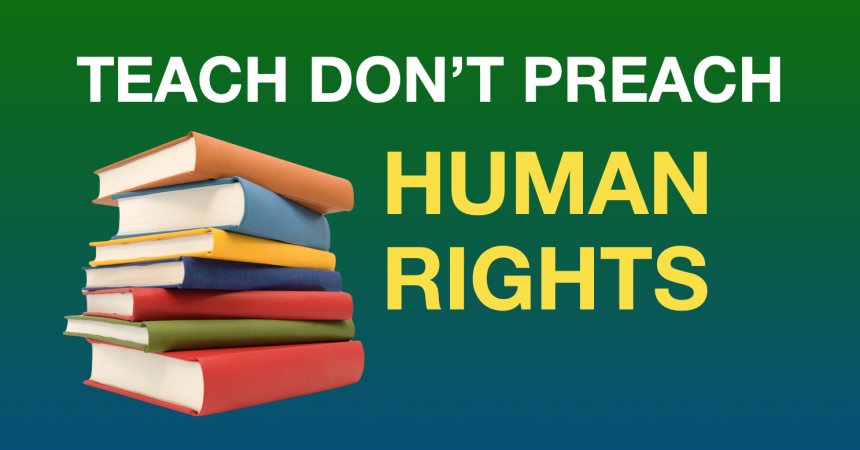
Equality before the law and equal protection of the law without discrimination
In 2008 the UN Human Rights Committee raised concern regarding the right to freedom of conscience of secular parents and their children in publicly funded Irish National schools.
“22. The Committee notes with concern that the vast majority of Ireland’s primary schools are privately run denominational schools that have adopted a religious integrated curriculum thus depriving many parents and children who so wish to have access to secular primary education. (arts. 2, 18, 24, 26).
The State party should increase its efforts to ensure that non-denominational primary education is widely available in all regions of the State party, in view of the increasingly diverse and multi-ethnic composition of the population of the State party.”
Ireland has ratified this Covenant and consequently has an obligation to ensure that these human rights are guaranteed to all parents and children regardless of their religious or secular convictions.
The UN raised concern in relation to four specific human rights under the International Covenant on Civil & Political Rights. These human rights are:-
Article 18 – The right to freedom of conscience.
Article 2 – The right to be free from discrimination
Article 24 – The rights of the child
Article 26 – The right to equality before the law.
The UN has what they call General Comments which explain in detail specific human rights. General Comment 18 covers Article 2 and 26 – Equality before the law and equal protection of the law without discrimination.
General Comment 18 states that:-
“1. Non-discrimination, together with equality before the law and equal protection of the law without any discrimination, constitute a basic and general principle relating to the protection of human rights. Thus, article 2, paragraph 1, of the International Covenant on Civil and Political Rights obligates each State party to respect and ensure to all persons within its territory and subject to its jurisdiction the rights recognized in the Covenant without distinction of any kind, such as race, colour, sex, language, religion, political or other opinion, national or social origin, property, birth or other status. Article 26 not only entitles all persons to equality before the law as well as equal protection of the law but also prohibits any discrimination under the law and guarantees to all persons equal and effective protection against discrimination on any ground such as race, colour, sex, language, religion, political or other opinion, national or social origin, property, birth or other status.”
Article 2 limits the scope of the rights to be protected against discrimination to those provided for in the Covenant but Article 26 does not specify such limitations. Article 26 provides that all persons are equal before the law and are entitled to equal protection of the law without discrimination. The law shall guarantee to all persons equal and effective protection against discrimination on any of the enumerated grounds.
Ireland ignores these human rights obligations and denies secular parents and their children their right to equality before the law and equal protection of the law without discrimination.
The vast majority of publicly funded National schools in Ireland are under religious patronage.
Over 92% of National schools in Ireland operate a religious integrated curriculum. It is impossible for secular parents to opt their children out of religion that is integrated into all subjects under the curriculum and the daily life of the school. The Education Act 1998 obliges Board of Management to uphold and be accountable to the patron for so upholding, the ethos of the school.
National schools with a religious ethos can legally discriminate on entry in order to up hold their ethos.
The Employment Equality Act provides for an exemption from equality for religious, educational or medical institutions under the control of a religious body. The exemption permits a religious body to discriminate on grounds of religion regarding its employees and prospective employees. This legislation permits religious bodies to take any action which is “reasonably necessary” to prevent an employee from undermining its ethos. This part of the Act is wide-ranging and not limited to discrimination on the grounds of religion. This part of the Act can be applied to a teacher who does not conduct his/her private life in accordance with the teaching of a particular religion.
The Irish state is required to make such changes to domestic laws and practices as are necessary to ensure their conformity with the Covenant. Where there are inconsistencies between domestic law and the Covenant, article 2 requires that the domestic law or practice be changed to meet the standards imposed by the Covenant’s substantive guarantees (General Comment No. 31 – The Nature of the General Legal Obligation Imposed on States Parties to the Covenant).
In the Irish Republic secular parents and their children are second class citizens. Ireland has ignored these human rights obligations and continues to treat minorities as second class citizens.







0 Comments
No comments!
There are no comments yet, but you can be first to comment this article.